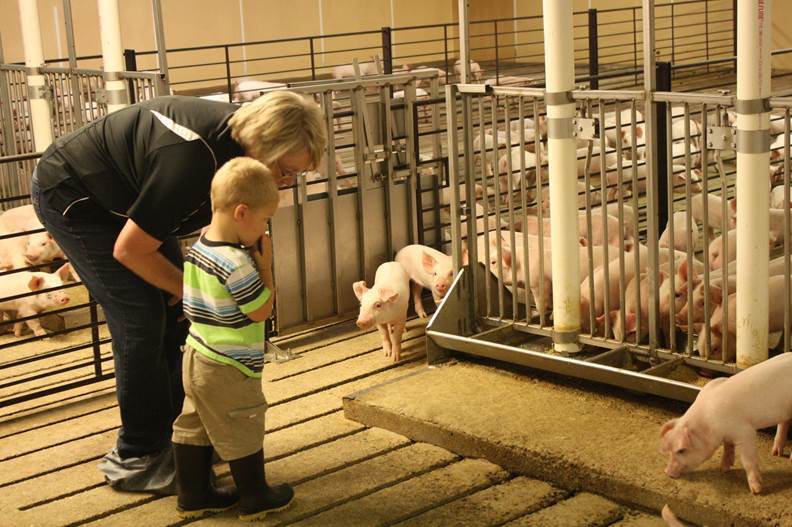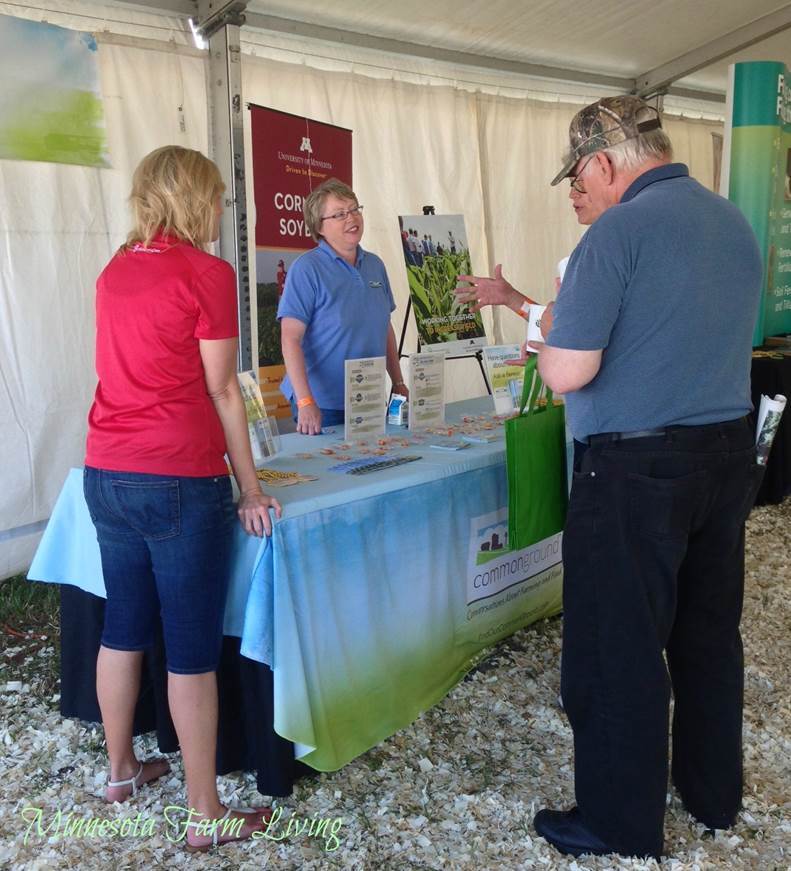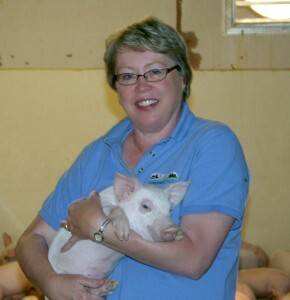Get a Glimpse of “Farm Living”
Ever since the 19th season of ABC’s The Bachelor premiered on January 5, folks have been debating whether Iowa farmer Chris Soules can find a bachelorette who can become his life partner. Many experts have offered advice and shared secrets to a happy marriage. Others wonder if a beauty from one of the coasts can actually live happily ever after in the middle of cornfields, especially during the winter months.
The truth is, a degree in agriculture or a background in farm life is not a prerequisite to become a supportive farm wife. Some of agriculture’s most well-known advocates were not raised on a farm. You might be surprised to learn that Carrie Mess, who blogs at “The Adventures of Dairy Carrie” was raised in Madison. Katie Olthoff, who blogs at “On the Banks of Squaw Creek,” never ever dreamed she’d become an advocate for agriculture and the turkey industry. Nor did Wanda Patsche grow up thinking she’d ever become well versed about #RealPigFarming.
In fact, Wanda never thought she’d live on a hog farm. Her best friend during high school lived on a hog farm and had to clean pig pens every weekend. Wanda watched her friend work one Saturday morning and professed she would never marry a hog farmer, but those words were spoken before she started dating Charles Patsche!
“My husband felt a calling to farm,” says Wanda. “He enjoys the feeling of planting a crop in the spring, watching it grow all summer long and then harvesting it in the fall. It’s experiencing the miracle of life that I’ve come to love, too.”
Wanda has a way with words. I truly enjoy her writing style and find her blogs so insightful and relatable, whether she’s talking about everyday life on the farm or sharing stories about her family. That’s why today I’m simply going to share her candid responses to my questions.
How long have you been blogging and why did you start?
Prior to blogging, I was involved in agvocating through Twitter and Facebook. I really wanted to give blogging a chance but didn’t feel I was qualified because I didn’t have a journalism or ag communication degree. I’m a grandma who also farms from rural Minnesota… Who would want to listen to me? But I had things I wanted to say! Then a couple of years ago, I attended an AgChat national conference where I met many other agvocates from across the country. This conference inspired me to blog, and I’ve been blogging for two years.
How did you get involved with agvocating and why do you believe it’s important for farmers to tell their stories?
Both my husband and I have been involved in the pork industry for many years. We both had served on the county board level, and I was also a member of a few state pork committees. In 2012, my family was selected as the 2012 Minnesota Pork Farm Family of the Year. Our children were on their own or at least in college at that time, so I had some extra time to promote agriculture, or I should say, “Correct the enormous amount of misinformation about ag.” It’s important that farmers tell their story because there are people/organizations taking advantage of the fact that the numbers of farmers are small. Honestly, there wasn’t the need years ago to communicate with consumers because they already had a connection to farming, whether it was their own background of growing up on a farm or at the very least, their parents grew up on a farm. Today, “transparency,” or talking to consumers about what they do and why, is new to farmers. Many are busy farming and don’t understand the need to engage with consumers. Farming has modernized and doesn’t look the same as in the past, so consumers have questions about today’s agriculture. They want to know farmers. Anti-ag people/organizations are also taking advantage of consumers’ disconnect to agriculture by spreading information about agriculture that is misleading, deceitful and outright wrong. We need to stop that movement – and we can by giving agriculture a face and telling our story in whatever way is comfortable to farmers. It can be as simple as talking to family and friends about what farmers do and why.
How do you respond to farmers who say, “I don’t have a story to tell”?
Everyone has a story. I am a grandma, who lives in rural Minnesota – in the middle of nowhere – who also farms. I can relate to many people, such as other moms who are so confused about the food they are feeding their families. I listen to their concerns and engage in conversations about what we do and why we do it. We are just normal, regular people growing food for families. Consumers want and deserve to hear from us. 
What do you enjoy most about farming?
There is nothing better than the feeling of growing and raising food for other families. It’s humbling and a huge responsibility. None of which we take for granted.
What do you wish consumers understood better?
Just this week I posted a blog with 7 things farmers wish for consumers (and families) in 2015. First and foremost, I wish for more truthful and less confusing marketing. Farmers care about our animals and our soils. We care for the environment. And even though nothing is perfect in farming, we try every single day to be better than the day before.
How has your online presence helped you connect with consumers?
It’s been amazing the connections I have made with consumers! People from all over the world read my blog. I actually had to use a translator to read comments left in German. It’s been an interesting journey. Through time and some training, I’m able to try and take “attack” statements and turn them into a conversation. Granted, it does not work every time because there are people who not want to converse. I’ve learned that it’s okay to walk away from them, but I have had so many other successes! And the unique aspect of an online social media presence is other people can also read the conversations. When I have online conversations, I think about other people who are lurking, reading and learning, too. 
How has your online presence connected you with more farmers?
This has been special! I’ve gotten to know so many farmers across the country and Canada online. When we meet in person, it’s like we’re old-time friends. It’s a very special bond. And it’s great because if I have a question about farming that I’m not familiar with, I almost always have someone I know that I can ask. Now if you have questions about farming, you know to ask Wanda! Learn more about #RealPigFarming and crop farming in the Midwest by following “Minnesota Farm Living” on Facebook and on Twitter @MinnFarmer. From reading my blogs, you know I enjoy a good recipe as much as I enjoy a good story! I especially enjoy Wanda’s Whiskey Peach Pork Chops, which I downloaded this fall from Prairie Californian. Now I’m looking forward to trying her crockpot recipe for pulled pork. Hopefully, you will, too!
Chili Rub Slow Cooker Pulled Pork
Ingredients
Ingredients:
- 1, 3-lb boneless pork shoulder or sirloin roast
- 2 Tbsp chili pepper powder
- 1 1/2 tsp. salt
- 1/2 tsp. cayenne pepper powder
- 1 Tbsp. canola oil
- 1/2 c. chicken broth
Instructions
Directions:
- Line a 9x13-inch baking pan with foil and place the pork in the pan.
- In a small bowl, combine the chili powder, salt and cayenne pepper.
- Rub the mixture over all sides of the meal, pressing it to adhere. (If the meat is tied together with twine or netting, just rub the seasoning over it.) Set aside.
- In a large skillet over medium-high heat, warm the oil.
- Add the pork and brown on all sides, 6-8 minutes. Transfer the meat to a slow cooker.
- Add the broth to the skillet, scraping up any browned bits. Add the broth to the slow cooker, cover.
- Cook until the pork is very tender (6 to 8 hours on low).
- Transfer the meat to a cutting board and let rest 10 to 15 minutes.
- Use two forks to shred meat into bite-sized pieces.
- Moisten/season with cooking juices to taste.
Notes
Prep time: 10 minutes
Cook time: 6-8 hours
Yield: 8-10 servings
Recipe & photo from PorkBeInspired.com
